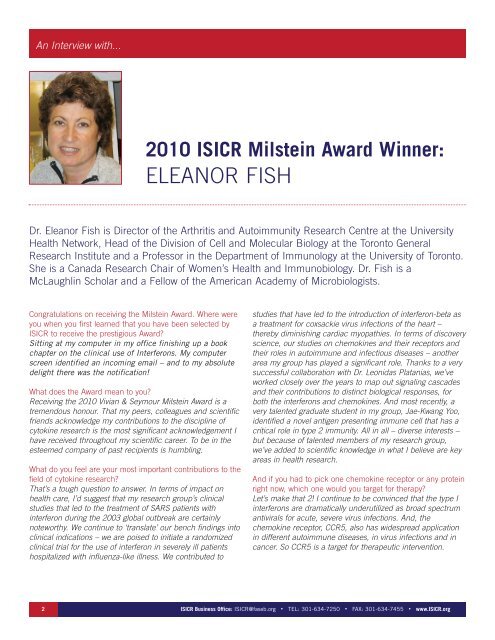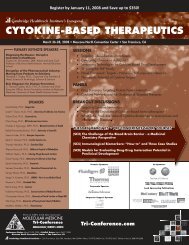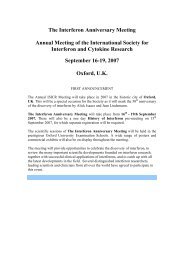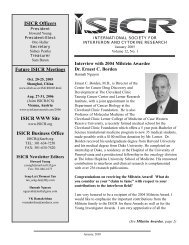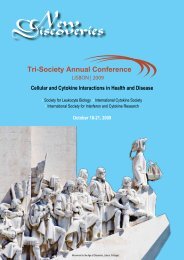9th Joint Meeting ISICR-ICS Cytokines & Interferons: From the ...
9th Joint Meeting ISICR-ICS Cytokines & Interferons: From the ...
9th Joint Meeting ISICR-ICS Cytokines & Interferons: From the ...
You also want an ePaper? Increase the reach of your titles
YUMPU automatically turns print PDFs into web optimized ePapers that Google loves.
An Interview with...<br />
2010 <strong>ISICR</strong> Milstein Award Winner:<br />
ELEANOR FISH<br />
Dr. Eleanor Fish is Director of <strong>the</strong> Arthritis and Autoimmunity Research Centre at <strong>the</strong> University<br />
Health Network, Head of <strong>the</strong> Division of Cell and Molecular Biology at <strong>the</strong> Toronto General<br />
Research Institute and a Professor in <strong>the</strong> Department of Immunology at <strong>the</strong> University of Toronto.<br />
She is a Canada Research Chair of Women’s Health and Immunobiology. Dr. Fish is a<br />
McLaughlin Scholar and a Fellow of <strong>the</strong> American Academy of Microbiologists.<br />
Congratulations on receiving <strong>the</strong> Milstein Award. Where were<br />
you when you first learned that you have been selected by<br />
<strong>ISICR</strong> to receive <strong>the</strong> prestigious Award?<br />
Sitting at my computer in my office finishing up a book<br />
chapter on <strong>the</strong> clinical use of <strong>Interferons</strong>. My computer<br />
screen identified an incoming email – and to my absolute<br />
delight <strong>the</strong>re was <strong>the</strong> notification!<br />
What does <strong>the</strong> Award mean to you?<br />
Receiving <strong>the</strong> 2010 Vivian & Seymour Milstein Award is a<br />
tremendous honour. That my peers, colleagues and scientific<br />
friends acknowledge my contributions to <strong>the</strong> discipline of<br />
cytokine research is <strong>the</strong> most significant acknowledgement I<br />
have received throughout my scientific career. To be in <strong>the</strong><br />
esteemed company of past recipients is humbling.<br />
What do you feel are your most important contributions to <strong>the</strong><br />
field of cytokine research?<br />
That’s a tough question to answer. In terms of impact on<br />
health care, I’d suggest that my research group’s clinical<br />
studies that led to <strong>the</strong> treatment of SARS patients with<br />
interferon during <strong>the</strong> 2003 global outbreak are certainly<br />
noteworthy. We continue to ‘translate’ our bench findings into<br />
clinical indications – we are poised to initiate a randomized<br />
clinical trial for <strong>the</strong> use of interferon in severely ill patients<br />
hospitalized with influenza-like illness. We contributed to<br />
studies that have led to <strong>the</strong> introduction of interferon-beta as<br />
a treatment for coxsackie virus infections of <strong>the</strong> heart –<br />
<strong>the</strong>reby diminishing cardiac myopathies. In terms of discovery<br />
science, our studies on chemokines and <strong>the</strong>ir receptors and<br />
<strong>the</strong>ir roles in autoimmune and infectious diseases – ano<strong>the</strong>r<br />
area my group has played a significant role. Thanks to a very<br />
successful collaboration with Dr. Leonidas Platanias, we’ve<br />
worked closely over <strong>the</strong> years to map out signaling cascades<br />
and <strong>the</strong>ir contributions to distinct biological responses, for<br />
both <strong>the</strong> interferons and chemokines. And most recently, a<br />
very talented graduate student in my group, Jae-Kwang Yoo,<br />
identified a novel antigen presenting immune cell that has a<br />
critical role in type 2 immunity. All in all – diverse interests –<br />
but because of talented members of my research group,<br />
we’ve added to scientific knowledge in what I believe are key<br />
areas in health research.<br />
And if you had to pick one chemokine receptor or any protein<br />
right now, which one would you target for <strong>the</strong>rapy?<br />
Let’s make that 2! I continue to be convinced that <strong>the</strong> type I<br />
interferons are dramatically underutilized as broad spectrum<br />
antivirals for acute, severe virus infections. And, <strong>the</strong><br />
chemokine receptor, CCR5, also has widespread application<br />
in different autoimmune diseases, in virus infections and in<br />
cancer. So CCR5 is a target for <strong>the</strong>rapeutic intervention.<br />
2 <strong>ISICR</strong> Business Office: <strong>ISICR</strong>@faseb.org • TEL: 301-634-7250 • FAX: 301-634-7455 • www.<strong>ISICR</strong>.org


